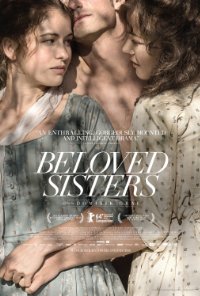
BELOVED SISTERS/ DIE GELEIBTEN SCHWESTERN
Germany, 2014, 138 minutes, Colour.
Hannah Herzsprung, Florian Stetter, Henriette Confurius, Claudia Messner, Ronald Zehrfeld.
Directed by Dominik Graf.
Beloved Sisters is a portrait of the writer, Friedrich Schiller, one of the key thinkers of the German Enlightenment, along with such other writers such as Goethe.
This portrait, directed by eminent German director, Dominik Graff, is a blend of romance and biography as well as an attempt to indicate the stature of Schiller in the period. However, the emphasis seems to be more on romance and relationships, Schiller and his link with the two sisters, the menage a trois established with them, rather than an exploration of his literary talent and his thinking.
There is a lot of acclaim about Schiller and his reputation, especially the sequence where he gives the key lecture in history, crowds present, to great acclaim – however, the screenplay gives little indication of the content of his lecture.
Schiller encounters two sisters during a period of ill health. Both of the sisters fall in love with him. The sisters are very close in their own relationship and are comfortable, each of them, having a passionate relationship with Schiller and with the menage a trois. One of the complications is that the older sister is already married, a cold husband, wanting a divorce and finally getting one. The other sister is unmarried and eventually marry Schiller and has a child.
One of the attractions of the film is its recreation of the 18th century in Germany, costumes, decor, design as well is the musical score.
However, the pacing of the material and the less than compelling drama of the relationships means that the film seems very long and the less persuasive for being so. It is a film for those who want to know something about Schiller and some themes from the German Enlightenment.
1. The blend of historical drama and romance?
2. The style of the film, more like a mini-series rather than a cinema drama?
3. The 18th century, Weimar, the areas of Germany? Costumes, decor, design? The world of the wealthy, the ordinary? Homes, universities, the countryside?
4. The score and atmosphere?
5. Audience knowledge of Schiller, his prestige, among the writers of the period, the Enlightenment, German literature, poetry, history, philosophy? How much was incorporated into the film? The content of his key lecture on history?
6. The personal portrait of Schiller, his age, experience, expelled by the authorities, his later return? His health, the encounter with the women, the attraction, with each of the two sisters, with their mother? The menage? The years passing, the details of the relationship? The genuineness of this love of each sister? The women’s mother and her influence?
7. The portrait of the two sisters, their ages, one married, the other not? Their experience, the influence of their mother? The inheritance? The scenes with Schiller, each loving him? The years passing? Charlotte staying, marrying, the child? Caroline, her marriage, her intensity, yet her cold husband, alienation? The different moods and crises? The absence?
8. The range of friends, society?
9. The mother, her visit, her demands, her death?
10. The years passing? Caroline and her absence the years? Her relationship with help Willhelm? His friendship with Schiller?
11. Into the 19th century, Schiller, his illness, the care for him, his death?
12. Schiller’s place in German history, literature?